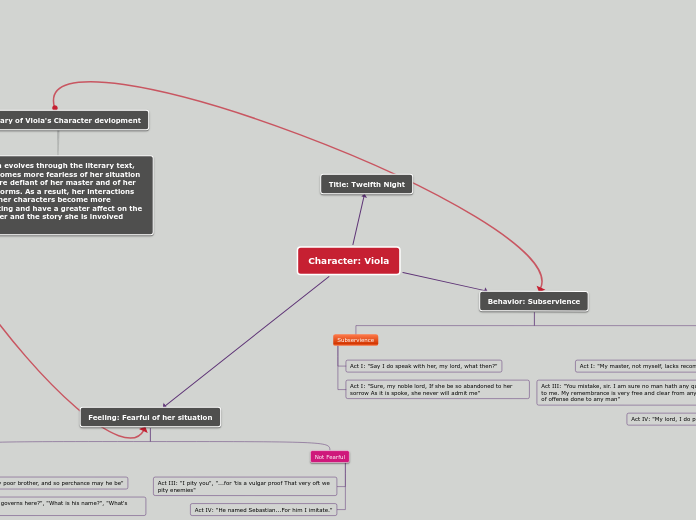par Daniel Vargas Il y a 5 années
342
Character: Viola
Viola's character journey reflects a transition from subservience to defiance, challenging both her master and societal expectations. Initially depicted as subservient and fearful, Viola'

par Daniel Vargas Il y a 5 années
342

Plus de détails
Name the character
Type in the name of the character whose change throughout the story you are going to analyze.
Example: Nick Carraway.
Character's behavior
Think of the character's behavior at the beginning of the story and look for the way it changed throughout the story.
Change in behavior
In what way did the character change the other behavior(s) you mentioned? Type in a relevant quote.
Example:
'You said a bad driver was only safe until she met another bad driver? Well, I met another bad driver, didn't I? [...]
I thought you were rather an honest, straightforward person. I thought it was your secret pride.'
Change in behavior
How did the character change the first behavior you mentioned? Type in a quote to prove your statement.
Example: Nick assumes the whole responsibility for Gatsby's funeral arrangements, 'with that intense personal interest to which every one has some vague right at the end.'
Initial behavior
What is the character's behavior at the beginning of the story? Type in a relevant quote for your statement.
Example: Nick seems to be an honest person, calling himself 'one of the few honest people that I have ever known'.
Initial behavior
How does the character act at the beginning of the story? Type in a relevant quote for your statement.
Example: Nick shows his immature side as he leaves to New York in order to avoid 'being rumored into marriage' with his girlfriend.
Character's feelings
Focus on the way the character's feelings are presented at the beginning and at the end of the story, while explaining why they have changed.
Change of feelings
How did the character change the belief you mentioned?
Type in a relevant quote for his change.
Example: 'Winter night and the real snow, our snow(...)We drew in deep breaths of it . . . unutterably aware of our identity with this country for one strange hour before we melted indistinguishably into it again. That's my middle-west.' - Nick on the purity and integrity of Midwest.
Change of feelings
In what way did the character change the feeling you mentioned?
Type in a quote to support your statement.
Example: 'They are a rotten crowd. You're worth the whole damn bunch put together.' - Nick criticizing the Buchanans.
Initial feelings
What was the character's initial belief? Type in a relevant quote.
Example: 'seems like the ragged edge of the universe' - Nick talking about Midwest, the place where he grew up.
Initial feelings
How does the character feel about a certain subject at the beginning of the story? Type in a relevant quote to support your statement.
Example: "Reserving judgements is a matter of infinite hope."
Title
Type in the title and author of the literary work that introduces the character.
Example: The Great Gatsby, by F. Scott Fitzgerald.